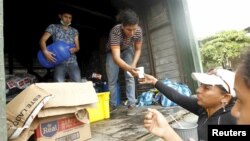Survivors of an earthquake that killed 570 people and shattered Ecuador's coast clamored for food, water and medicine on Thursday as aid eluded more remote parts of the disaster zone.
President Rafael Correa's socialist government, facing a mammoth rebuilding task at a time of slashed oil revenues in the OPEC nation, said there was no lack of supplies — just problems with distribution that should be quickly resolved.
"We're trying to survive. We need food," said Galo Garcia, 65, a lawyer, waiting in line for water from a truck sent to the beachside village of San Jacinto. "There's nothing in the shops. We're eating the vegetables we grow."
A crowd nearby chanted: "We want food."
The government quickly moved supplies to the main towns and set up shelters for more than 25,000 people in soccer stadiums and airports. But shattered roads have impeded the operation.
Many people left villages seeking help. On roads near Pedernales, one of the worst-hit towns, children from rural areas held signs begging for food.
Jose Rodriguez, 24, drove two hours from Calceta village to a food storage point outside Pedernales.
"It's not reaching us," he said, giving his address and phone number to a military office. "I came here to see if they could give me something but it's impossible."
A government official asked another supplicant, Jose Gregorio Basulor, 55, to stay calm. "I can be patient but not the children!" he shouted back. "They are crying."
Economic measures
Correa has said Ecuador will temporarily increase some taxes, offer assets for sale and possibly issue bonds abroad to fund reconstruction after Saturday's 7.8 magnitude quake.
He has estimated damage at $2 billion to $3 billion.
Lower oil revenue already had left the nation of 16 million people facing near-zero growth and lower investment.
Ecuador's worst earthquake in nearly seven decades also injured 7,000 people, left 155 missing and damaged close to 2,000 buildings, according to the government. Scores of foreign aid workers and experts have arrived and 14,000 security personnel are keeping order, with only sporadic looting.
"There are rumors there's a shortage of water," Correa said late on Wednesday, responding to complaints about the aid operation. "We have plenty of water. The problem is distribution," he added, promising speedy solutions.
Correa said the death toll would have been lower had Ecuadoreans respected building regulations beefed up after the 2010 earthquake in Haiti that killed more than 300,000 people.
Ecuadoreans had a mixed reaction to the new taxes and another measure to donate one day's salary to help relief work.
"Nobody likes paying taxes because even before the earthquake things were difficult," said student Isaac Andrade, 27, in the city of Guayaquil. "But I think it's consistent with the spirit of solidarity."
He insisted the government and parliamentarians also should give an example of austerity.
The government appealed for foreign tourists to keep coming to fuel an industry that generated $1.7 billion last year.
But visitors may be put off by health warnings from the quake zone. One charity, CARE International, said there was an immediate threat of mosquito-borne diseases including the Zika virus and dengue fever.
"There is a lot of stagnant water which greatly increases the number of breeding sites for mosquitoes," said Lucy Harman, emergency team leader in Ecuador for CARE, which was supplying water purification tablets and temporary water tanks.
Rescuers were using face masks against the smell of decomposing bodies, while soldiers were vaccinated before being deployed in the area.
The United Nations and partners were to launch an appeal on Friday to help an estimated 350,000 people needing aid.





